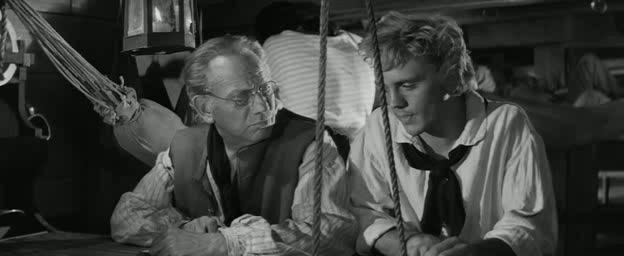Earthly Angels: Iolanta and Billy Budd
Last month, I saw two excellent productions which I've been meaning (ever since) to talk about. One was an opera - the Met's new/first production of Iolanta, by Tchaikovsky, starring Anna Netrebko and Piotr Beczala. The second was Billy Budd, a 1962 adaptation of Melville's novella, with Peter Ustinov playing Captain Vere.
Iolanta is about a princess who was born blind, and kept ignorant of the fact. Her father, King René, insists she lives a sheltered, solitary life in the forest, hoping somehow that her betrothed, Robert, will also never learn of her blindness (until after they are married). The king tries to enlist the help of a surgeon to give Iolanta her eyesight, though the outlook, he feels, is not promising. Meanwhile, unbeknownst to him, Iolanta has been found by the knight Vaudémont, who falls in love with her instantly...but is it also unconditionally?
This is such a beautiful story that it's amazing the Met waited so long. The plotline, surprisingly deep, poses a dilemma to the audience - would you tell someone the truth about herself, at the risk of ruining her life? Iolanta is innocent, sweet-natured, and, for the most part, content; a Cinderella whose happy ending seems ambiguous. I didn't have to try to connect with this story; really, it was incredibly moving.
And, of course, who better to debut this opera than Netrebko and Beczala, adding, to their splendid voices, their thoughtful acting which goes a long way in "Live in HD" (I watched this at the movie theater). I was also really impressed with the supporting cast, and King René's aria, sung by Ilya Bannik, was one of the best parts.
One quibble - it can't be denied that this production (by Mariusz Trelinski) is aesthetically beautiful, with sort of a gothic French Alps vibe going on. However, I think it was ill-advised to make it so dark...he made all the supporting characters (except Robert) to appear sinister, and that made the buildup fizzle out at the ending. The king may be an antagonist, but there's a difference between that and a villain. Anyways, you can tell by Tchaikovsky's lyrics that the story isn't intended to have this theme, and that adds a layer of incongruity that often got in the way of the story.
You'll remember I rated highly the story Billy Budd. Subsequently, I became curious to know if there were any good adaptations of it. I actually found an extraordinary YouTube clip of a production starring - brace yourselves - William Shatner and Basil Rathbone. Then I watched about twenty minutes of the opera, which was both fascinating and gave me the creeps (and I do intend to finish it one day). The next thing was this 60s movie, with Terence Stamp as Billy.
It far exceeded my expectations. I felt like this two-hour film was way too long for such a short story, but, apart from the filler (which, in spirit, was still true to the book), it was a first-rate adaptation. I was watching it with some of my family members, and it kept their interest as well...I was so glad it was true to the book, and kept you guessing until the end what the outcome would be.
Stamp was perfect as Billy, not only for looking like the "Handsome Sailor," but for portraying Billy's character - innocent, yet human, and in some ways wiser than his years. As with Iolanta, you feel there's a fine line he's walking on, and something terrible could happen to make it all fall apart for him. That's good casting and good acting.
It was odd that Claggart was played by an American (Robert Ryan). (I had to keep telling myself he must have been impressed from a U.S. ship, though that might be an historical stretch.) However, he came across fairly convincing as Billy's self-appointed nemesis. Ustinov was excellent as Vere, encompassing the captain's nervousness, sense of justice, and pervading paranoia/wish to exert authority...amazing he was able to portray Vere so accurately (maybe the two hours are partly to thank).
As in Iolanta, the filmmaker decided to add a dark twist to the end of this plotline. I'm not sure what to think about it. Though it seems reasonable this way, I can't help but imagine that perhaps Melville more accurately described the crew mentality. Unsure.
Both of these - highly recommended!








Comments